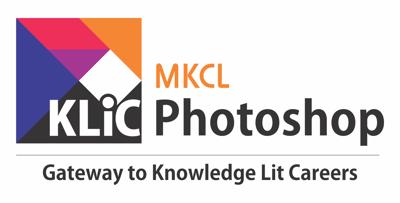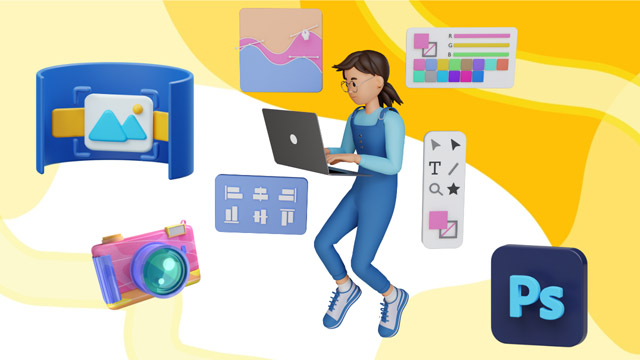- In this course, you will learn to:
- Classify photo collage components and techniques for creative layout design
- Organize and assemble photo books and albums focusing on layout and design principles
- Examine digital art creation by compositing multiple images with effects
- Operate editing tools to stitch and enhance panoramic photos effectively
- Create time-lapse videos by incorporating motion effects and export knowledge
- Identify the restoration methods to colorize and preserve vintage photographs
- Compare export settings for images distinguishing requirements for print and web
- Analyze intellectual property protection strategies including watermarking and knowledge of copyright laws
- Organize editing workflows using custom presets and actions for efficiency
- Recognize career opportunities in photo editing and relevant fields
- Identify career trends in photo editing, examining necessary skills, and creating impactful portfolios

Creative Effects and Artistic Enhancements in Image Editing
Apply stylized filters, textures, and digital effects to transform images into artistic and visually compelling works.
Introduction
What you'll learn ?
- At the end of this course, learners will be able to:
- Utilize components and techniques in photo collage creation for layout design
- Create photo books and albums applying layout and design principles
- Demonstrate digital art creation through image compositing and effects
- Formulate the use of editing tools to stitch and enhance panoramic photos effectively
- Illustrate time-lapse videos emphasizing motion effects and export
- Experiment with the restoration methods to colorize and preserve vintage photograph
- Identify export settings for images highlighting differences for print vs. web
- Demonstrate intellectual property protection using watermarking techniques and copyright knowledge
- Outline editing workflows incorporating presets and actions for efficiency
- Plan a career in photo editing
- Predict trends in photo editing recognizing skills for portfolio development
Syllabus
- Planning and Conceptualizing Collages
- Combining Multiple Photos Seamlessly
- Adding Text and Graphics to Collages
- Creative Layouts and Design
- Case Study - Photo Collage
- Organizing Images for Albums
- Layout and Design Principles
- Adding Captions and Descriptions
- Preparing Files for Printing
- Introduction to Digital Art
- Combining Multiple Images into Artworks
- Adding Fantasy Elements and Effects
- Surreal Compositing Techniques
- Shooting Panoramic Photos
- Stitching Panoramas in Editing Software
- Adjusting Exposure and Perspective
- Panorama Cropping and Enhancement
- Capturing Time-Lapse Sequences
- Importing and Sequencing Images
- Adding Motion and Effects
- Exporting and Sharing Time-Lapse Videos
- Applying Restoration Techniques
- Colorizing Vintage Photos
- Retaining the Authentic Look
- Preserving and Sharing Restored Photos
- Case Study - Wedding Photography Retouching
- Exporting Photos for Print and Web
- Preparing Images for Social Media
- Watermarking and Copyright
- Printing Your Photos
- Creating Custom Presets and Actions
- Keyboard Shortcuts and Efficiency Tips
- Building a Consistent Editing Style
- Backing Up Your Work
- The Landscape of Photo Editing Careers
- Job roles available in the market
- Industries that require photo editing professionals
- Skills Needed for a Career in Photo Editing
- Technical skills
- Soft skills for thriving in a photo-editing career
- Benefits of choosing a photo editing career
- Challenges faced in this profession
- Essential Education and Certifications
- Building an Online Portfolio
- Case Study - Creative Portfolio Enhancement
- Networking and Industry Connections
- Job Search Platforms and Strategies
- Freelance or job opportunities in Photoshop
- Preparing Your Resume and Cover Letter
- Continuous Learning and Upgradation
Certificate
- MKCL provides certificate (for 30/60/90 hours courses) to the KLiC learner after his/her successful course completion.
Academic Approach
The Academic Approach of the course focuses on the “work centric” education i.e. begin with work (and not from a book !), derive knowledge from work and apply that knowledge to make the work more wholesome, useful and delightful. The ultimate objective is to empower the Learner to engage in socially useful and productive work. It aims at leading the learner to his/her rewarding career as well as development of the society.
Learning methodology
- Learners are given an overview of the course and its connection to life and work.
- Learners are then exposed to the specific tool(s) used in the course through the various real-life applications of the tool(s).
- Learners are then acquainted with the careers and the hierarchy of roles they can perform at workplaces after attaining increasing levels of mastery over the tool(s).
- Learners are then acquainted with the architecture of the tool or Tool Map so as to appreciate various parts of the tool, their functions and their inter-relations.
- Learners are then exposed to simple application development methodology by using the tool at the beginner’s level
- Learners then perform the differential skills related to the use of the tool to improve the given ready-made outputs.
- Learners are then engaged in appreciation of real-life case studies developed by the experts.
- Learners are then encouraged to proceed from appreciation to imitation of the experts.
- After imitation experience, they are required to improve the expert’s outputs so that they proceed from mere imitation to emulation.
- Finally, they develop the integral skills involving optimal methods and best practices to produce useful outputs right from scratch, publish them in their ePortfolio and thereby proceed from emulation to self-expression.
Evaluation Pattern
Evaluation Pattern of KLiC Courses consists of 4 Sections as per below table:
| Section No. | Section Name | Total Marks | Minimum Passing Marks |
|---|---|---|---|
| 1 | Learning Progression | 25 | 10 |
| 2 | Internal Assessment | 25 | 10 |
| 3 | Final Online Examination | 50 | 20 |
| Total | 100 | 40 | |
| 4 | SUPWs (Socially Useful and Productive Work in form of Assignments) | 5 Assignments | 2 Assignments to be Completed & Uploaded |
MKCL’s KLiC Certificate will be provided to the learner who will satisfy the below criteria:
- Learners who have successfully completed above mentioned 3 Sections i.e. Section 1, Section 2 and Section 3
- Additionally, learner should have completed Section 4 (i.e. Section 4 will comprise of SUPWs i.e. Socially Useful and Productive Work in form of Assignments)
- Learner has to complete and upload minimum 2 out of 5 Assignments
Courses Fee Structure from 01 July, 2025 Onwards
KLiC 30 hour course fee applicable from 01 July, 2025 all over Maharashtra| KLiC Course Duration | MFO: MKCL Share (Including 18% GST) |
ALC Share (Service Charges to be collected by ALC) |
|---|---|---|
| 30 hours | Rs. 300/- | Rs. 1,500/- |
Important Points:
* Above mentioned fee is applicable for all Modes of KLiC Courses offered at Authorised Learning Center (ALC) and at Satellite Center
* Total fee is including of Course fees, Examination fees and Certification fees
* MKCL reserves the right to modify the Fee anytime without any prior notice
* Above mentioned fee is applicable for all Modes of KLiC Courses offered at Authorised Learning Center (ALC) and at Satellite Center
* Total fee is including of Course fees, Examination fees and Certification fees
* MKCL reserves the right to modify the Fee anytime without any prior notice
